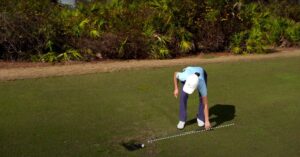What Is A Birdie In Golf? [Explained]
Golf is a sport with many unique terms and phrases that may be unfamiliar to those new to the game. One of these terms is “birdie.” In golf, a birdie score is one stroke better than par on a hole.
It is a term that is used frequently on the golf course, and understanding what it means is essential for any golfer.
In this blog post, we will take a closer look at the meaning of a birdie and how it is scored in the game of golf, along with some other facts that you may be interested in. So, let’s tee off and dive into the world of golf terminology!
![What Is A Birdie In Golf? [Explained] 1 What Is A Birdie In Golf?](http://giftedgolfers.com/wp-content/uploads/2023/01/image-34-1024x521.png)
What is the origin of the term “birdie” in golf?
The term “birdie” in golf is believed to have originated in the late 19th century.
According to one theory, it was first used by an American golfer named Ab Smith, who was said to have exclaimed, “That was a bird of a shot!” after hitting an especially good shot.
The term “bird” then became associated with a score of one stroke below par; over time, it was shortened to “birdie.”
Another theory suggests that the term “birdie” comes from the phrase “bird of a shot,” which was used to describe an exceptional shot.
As golfers would shout “bird” after a shot that was particularly good, the term eventually became associated with a score of one below par.
Another theory is that the term birdie comes from the old Scottish word “birnie” meaning “little bird.” The word would then have been used to describe a small score, which is one below par since a birdie is a small bird.
It is not certain which theory is correct, but all of them suggest that the term birdie has been used to describe a score below par for a long time.
How is a birdie scored in golf?
![What Is A Birdie In Golf? [Explained] 2 How is a birdie scored in golf?](http://giftedgolfers.com/wp-content/uploads/2023/01/image-35-1024x496.png)
A birdie is a score of one stroke below par on a hole. In other words, if a hole has a par of 4, a birdie would be scored by completing the hole in 3 strokes.
To score a birdie, a golfer must first tee off and try to get their ball as close to the hole as possible on their first shot. In the following shots, the golfer will use various clubs to try and sink the ball into the hole.
Once the ball is in the hole, the golfer will record the number of strokes it took them to complete the hole, and if it is one less than the par for that hole, they will have scored a birdie.
It’s important to note that a golfer can’t score a birdie on a hole with a par of 3 because it’s impossible to score one stroke less than par.
Also, if the golfer gets the ball in the hole in one less stroke than par, but on the next hole they score two more strokes than par, the golfer will have a net score of par for the round and not a birdie
How does getting a birdie affect a golfer’s overall score?
![What Is A Birdie In Golf? [Explained] 3 How does getting a birdie affect a golfer's overall score?](http://giftedgolfers.com/wp-content/uploads/2023/01/image-33-1024x653.png)
A birdie can have a significant impact on a golfer’s overall score. In golf, the goal is to complete each round of 18 holes with the fewest number of strokes possible, and each hole is assigned a “par” value that represents the number of strokes a skilled golfer should take to complete it.
When a golfer scores a birdie on a hole, it means that they completed the hole in one stroke less than par.
This can positively impact their overall score as it reduces the total number of strokes they need to complete the round.
For example, if a golfer is playing a round of golf and scores a birdie on a hole with a par of 4, they would have completed the hole in 3 strokes.
This would be one stroke less than the golfer would be expected to take and would be recorded as -1 on their scorecard.
Additionally, a golfer’s score is often compared to par, so getting a birdie can also help a golfer to have a positive score relative to par.
This can be very important in competitions and tournaments, where a golfer’s score relative to par often determines their standing among other competitors.
Overall, getting a birdie can positively impact a golfer’s overall score by reducing the number of strokes they need to complete a round and by helping them to have a positive score relative to par.
Can a golfer achieve a birdie on any hole, or are there specific requirements?
![What Is A Birdie In Golf? [Explained] 4 Can a golfer achieve a birdie on any hole, or are there specific requirements?](http://giftedgolfers.com/wp-content/uploads/2023/01/image-36-1024x535.png)
A golfer can achieve a birdie on any hole if they can complete the hole in one less stroke than par.
The number of strokes required to complete a hole is referred to as the hole’s “par” and is determined by the length and difficulty of the hole.
For example, if a hole has a par of 4, a golfer must complete the hole in 3 strokes or less to achieve a birdie.
How often do professional golfers typically score a birdie during a round?
It depends on the golfer and the course they are playing. The frequency of birdies can vary greatly between professional golfers and depending on the course difficulty and layout.
![What Is A Birdie In Golf? [Explained] 5 How often do professional golfers typically score a birdie during a round?](http://giftedgolfers.com/wp-content/uploads/2023/01/image-37.png)
On average, professional golfers will score a birdie on about one in every four holes, or 25% of the time. However, some golfers may score birdies more frequently, while others may score them less frequently.
On a more challenging course, the frequency of birdies is expected to be lower than on an easier course.
Factors such as the golfer’s skill level, the conditions of the course, and the golfer’s performance on that particular day can all affect the frequency of birdies.
It’s also worth noting that on a professional tour, such as the PGA or European Tour, the frequency of birdies will differ from tournament to tournament, depending on the course, difficulty, and weather.
It’s also noteworthy that a professional golfer who is leading a tournament will typically play more conservatively and make fewer birdies to maintain their lead.
In comparison, a golfer trailing the leader may take more risks to make up ground and typically make more birdies.
Are there any strategies for consistently making birdies on the golf course?
It’s important to note that making birdies is not always easy, and it’s not a guarantee even for the best professional golfers.
However, it is also true that several strategies can help a golfer consistently make birdies on the golf course.
![What Is A Birdie In Golf? [Explained] 6 Are there any strategies for consistently making birdies on the golf course?](http://giftedgolfers.com/wp-content/uploads/2023/01/image-38-1024x539.png)
By implementing the following strategies and consistently working on your game, you can increase your chances of making birdies and playing better golf.
Proper Course Management
This means understanding the layout of the course, knowing where the hazards are, and choosing the right club for each shot.
By playing smart and avoiding mistakes, a golfer can increase their chances of making birdies.
Strong Short Game
A good short game, including putting and chipping, can help a golfer save strokes and make birdies on holes where they may not hit the green in regulation.
Accurate Driving
Hitting fairways and avoiding hazards can set up a golfer for birdie opportunities by providing them with good approach shots.
Confidence and a Positive attitude
Golf is a mental game, and having confidence in your abilities and a positive attitude can help you to stay focused and play your best.
Practice and preparation
Consistently practicing different shots and working on your game can help you to improve your skills and increase your chances of making birdies.
Knowing your strengths and weaknesses
Knowing what you are good at and focusing on that during the round can help you to make birdies.
At the same time, knowing your weaknesses and working on them can help you to decrease the number of bogeys or double bogeys.
![What Is A Birdie In Golf? [Explained] 7 Knowing your strengths and weaknesses in golf](http://giftedgolfers.com/wp-content/uploads/2023/01/image-39-1024x584.png)
Are there any rewards or bonuses for getting a certain number of birdies in a round?
Some golf tournaments or leagues may offer bonuses or rewards for achieving a certain number of birdies in a round or over some time.
However, this is not a standard game feature and would be determined by the specific event or organization.
Additionally, some golfers may have personal goals or challenges, such as trying to achieve a certain number of birdies in a round or over a season.
But this would be a personal accomplishment rather than a formal award or recognition.
Final Words
Understanding what a birdie is and how it is scored is essential for any golfer, whether you are a beginner or a seasoned pro.
Making a birdie can be a great accomplishment on the golf course and can help to boost a player’s confidence and overall score.
So, the next time you’re out on the course, remember that a birdie is a score to strive for and can be a great way to improve your game. Happy golfing!

![What Is A Bogey In Golf? [Explained] What-Is-A-Bogey-In-Golf](https://giftedgolfers.com/wp-content/uploads/2023/01/What-Is-A-Bogey-In-Golf-300x157.jpg)



![How To Hang Golf Towel With Hole In Middle? [Complete Guide] how-to-hang-golf-towel-with-hole-in-middle](https://giftedgolfers.com/wp-content/uploads/2023/06/how-to-hang-golf-towel-with-hole-in-middle-300x157.jpg)
